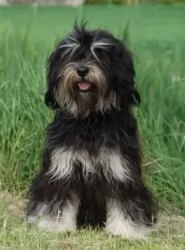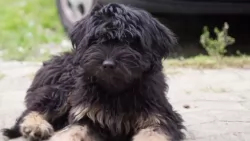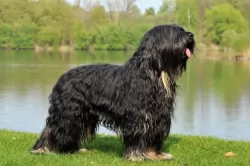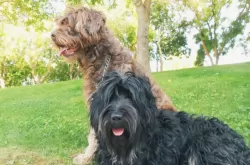 MyDogBreeds
MyDogBreeds Cao da Serra de Aires is originated from Portugal but Briard is originated from France. Cao da Serra de Aires may grow 14 cm / 5 inches shorter than Briard. Cao da Serra de Aires may weigh 13 kg / 28 pounds lesser than Briard. Both Cao da Serra de Aires and Briard has almost same life span. Cao da Serra de Aires may have less litter size than Briard. Cao da Serra de Aires requires Moderate maintenance. But Briard requires High maintenance
Cao da Serra de Aires is originated from Portugal but Briard is originated from France. Cao da Serra de Aires may grow 14 cm / 5 inches shorter than Briard. Cao da Serra de Aires may weigh 13 kg / 28 pounds lesser than Briard. Both Cao da Serra de Aires and Briard has almost same life span. Cao da Serra de Aires may have less litter size than Briard. Cao da Serra de Aires requires Moderate maintenance. But Briard requires High maintenance
 Ancestors of the Cao da Sera de Aires were used for herding livestock in the Serra de Aires and Alentejo, Portugal. This herding dog is native to Portugal and throughout the 20th Century he was kept as a working dog.
Ancestors of the Cao da Sera de Aires were used for herding livestock in the Serra de Aires and Alentejo, Portugal. This herding dog is native to Portugal and throughout the 20th Century he was kept as a working dog.
Known also as the Portuguese Sheepdog, Portuguese Shepherd Dog or Serra de Aires Mountain Dog, there are some questions surrounding the breed's ancestry as there are few records of dogs before 1900. The dog is thought to be related to the Pyrenean and Catalan Sheepdogs and that it has descended from Briards which were imported into Portugal and crossed with the Pyrenean Sheepdog.
The Cão da Serra de Aires breed standard was accepted by the Portuguese Kennel Club, and the breed was recognized internationally in 1996. The dog was also recognized by the United Kennel Club in the Herding Group in 2006.
 Through myth and legend, the Briard is thought to be a very ancient dog. A French herding breed, a Briard type of dog appears in writings as early as the end of the 14th century. According to legends the Briard was owned by Napoleon, Charlemagne, Lafayette and Thomas Jefferson. As a cross between the Barbet and the Beauceron, the Briard came into popularity following its appearance in a Paris dog show in 1863. Bred originally to guard and herd sheep, these intelligent, independent dogs were often left on their own. Because they both guarded and herded, their size and structure as well as their personalities were different from other dogs that worked sheep. Those that herded only were fast, agile and smaller. Those that only guarded were heavier, bigger and stronger. The Briard was in-between these two types of breeds. He was well suited to any kind of farm work and guarded the crops from the sheep’s desire to eat them. They moved the sheep from one grazing area to another and then to their holding area at night. No humans had to assist the Briard in this work once they were trained.
Through myth and legend, the Briard is thought to be a very ancient dog. A French herding breed, a Briard type of dog appears in writings as early as the end of the 14th century. According to legends the Briard was owned by Napoleon, Charlemagne, Lafayette and Thomas Jefferson. As a cross between the Barbet and the Beauceron, the Briard came into popularity following its appearance in a Paris dog show in 1863. Bred originally to guard and herd sheep, these intelligent, independent dogs were often left on their own. Because they both guarded and herded, their size and structure as well as their personalities were different from other dogs that worked sheep. Those that herded only were fast, agile and smaller. Those that only guarded were heavier, bigger and stronger. The Briard was in-between these two types of breeds. He was well suited to any kind of farm work and guarded the crops from the sheep’s desire to eat them. They moved the sheep from one grazing area to another and then to their holding area at night. No humans had to assist the Briard in this work once they were trained.
During World War 1, the Briards were drafted into service as messengers, sentries and search dogs for lost or injured soldiers. In that time frame the breed served almost to the point of extinction. Breeding programs following the war brought them back. Today the Briard is a home companion, a police dog, as well as both military and civilian search and rescue dogs.
 The beautiful Cão da Serra de Aires is a medium-sized dog. He stands at 45 to 55 cm at the withers and weighs about 17 to 27 kg. He is recognizable by the long, shaggy, single-layer coat, of straight or slightly wavy hair. Don’t be deceived by the coat as below, the dog has a muscular, athletic body.
The beautiful Cão da Serra de Aires is a medium-sized dog. He stands at 45 to 55 cm at the withers and weighs about 17 to 27 kg. He is recognizable by the long, shaggy, single-layer coat, of straight or slightly wavy hair. Don’t be deceived by the coat as below, the dog has a muscular, athletic body.
The coat comes in different shades such as fawn, gray, yellow and black. The dog has a long tail which is held straight out or down and he has medium-length, floppy ears. You’ve got to look hard, as the facial features of the dog are hidden by its shaggy coat. He has a lot of facial hair that sometimes you have to wonder if he can see out of his eyes.
The Cao da Serra de Aires is a wonderful canine companion and is devoted and loyal, forming strong bonds with their human family. He is a playful, amicable dog and gets on well with children in the home as well as with other pets.
He is intelligent and trainable, and when properly trained and socialized,he becomes an even nicer pet to have around and is obedient to his master’s voice. He is territorial, strong willed and dominant and makes a good watchdog too.
 The Briard is a powerful, intelligent and independent working dog. They have a straight topline and their height is almost the same as their length. They have long, large, rectangular heads with wide muzzles. Their noses are also square and jet black while their side set, large eyes can be black-brown or black. Their ears have traditionally been cropped but with more countries outlawing it, they can now have natural ears set high on the head. They have a tail that is feathered and low-cut. The feet of a Briard are round, compact and large.
The Briard is a powerful, intelligent and independent working dog. They have a straight topline and their height is almost the same as their length. They have long, large, rectangular heads with wide muzzles. Their noses are also square and jet black while their side set, large eyes can be black-brown or black. Their ears have traditionally been cropped but with more countries outlawing it, they can now have natural ears set high on the head. They have a tail that is feathered and low-cut. The feet of a Briard are round, compact and large.
The Briard is a double coated breed with a long beard and mustache. Their hair completely covers the head and the eyes so that they are not seen. They have prominent eyebrows as well.
 The Cão da Serra de Aires is such a loyal dog to his human family that he makes a splendid pet. He is active, having worked historically at herding and guarding.
The Cão da Serra de Aires is such a loyal dog to his human family that he makes a splendid pet. He is active, having worked historically at herding and guarding.
Socialization and obedience training ensure that he becomes an exceptional pet and he has a host of positive attributes to his name – he is intelligent, energetic, loyal and loving. He may have been used long ago to guard livestock, but today he is selected as a pet specifically for his excellent companionship and for his protective nature.
 As mentioned previously the Briard is intelligent and independent. They are also loyal, rugged, protective and bond intensely with their humans. They are often aloof when it comes to strangers or even when new furniture is introduced into the household. They have to learn that anything new into the family environment is friendly and good. They are great with children and susceptible to separation anxiety because of their deep affection for their people. Socialization for puppies is a must. This will let them know that people and children, other dogs in general are not harmful to their families. They have great memories and once they learn something – right or wrong – it is almost impossible to change it. They were bred to be independent thinkers who acted on their own conclusions. This is still true of the breed today, making them appear to be stubborn.
As mentioned previously the Briard is intelligent and independent. They are also loyal, rugged, protective and bond intensely with their humans. They are often aloof when it comes to strangers or even when new furniture is introduced into the household. They have to learn that anything new into the family environment is friendly and good. They are great with children and susceptible to separation anxiety because of their deep affection for their people. Socialization for puppies is a must. This will let them know that people and children, other dogs in general are not harmful to their families. They have great memories and once they learn something – right or wrong – it is almost impossible to change it. They were bred to be independent thinkers who acted on their own conclusions. This is still true of the breed today, making them appear to be stubborn.
They are great watchdogs, fearless and brave; willing to learn, eager to make you happy. They are basically gentle but that always runs up against their protective nature. A strong alpha leader is needed to handle this hard-working dog.
 As with most dogs that are looked after well, their health can be good. The Cao da Serra de Aires isn’t likely to keep you at the vet often. Just like with any good dog, there are some health disorders that can benefit you to know about.
As with most dogs that are looked after well, their health can be good. The Cao da Serra de Aires isn’t likely to keep you at the vet often. Just like with any good dog, there are some health disorders that can benefit you to know about.
Being forewarned , you can get your pet to the vet quickly before the illness gets out of hand.
There are some pet owners who want to have their pets tested by the Orthopedic Foundation for Animals as well as the Canine Eye Registration Foundation to rule out health defects such as hip dysplasia and cataracts before they manifest themselves in their pets. This is of particular importance to breeders so as to prevent the parent dogs passing bad genetic conditions to the puppies.
This is a common skeletal disease where the dog’s hip joints don’t develop properly. It can be terribly painful for your pet to get around. It’s a genetic condition and while it is more prevalent in big dogs, any breeds are susceptible.
Your dog will battle along with painful joints and sometimes his hind-end will be lame. You’ll notice that once lying down, he battles to get up again. Fortunately vets are well acquainted with this ailment and they have different options to treat and manage it.
Cataracts in your dog come about from a disease process which affects the lens of the eye. The eye loses its transparency and impairs vision. There are some instances where cataracts can cause blindness. You’ll see a whitish gray area in your pets eye. The most common cause of cataracts is genetics. Get your pet to the vet who will do certain tests to evaluate the eyes and make a recommendation.
 Being a large breed, the Briard shares many of the same health concerns as other large breeds. They have a few of their own as well. Typical issues for a Briard might include:
Being a large breed, the Briard shares many of the same health concerns as other large breeds. They have a few of their own as well. Typical issues for a Briard might include:
Progressive Retinal Atrophy/Degeneration –degeneration of the photoreceptors and retina.
 As a working dog used to long hours of action, the Cao da Serra de Aires will need lots of activity. He’ll need you taking him for long walks and playing ball games with him. He can become frustrated and destructive when left without any physical stimulation.
As a working dog used to long hours of action, the Cao da Serra de Aires will need lots of activity. He’ll need you taking him for long walks and playing ball games with him. He can become frustrated and destructive when left without any physical stimulation.
The Cao da Serra de Aires may have long hair but he isn’t high maintenance. He won’t require professional grooming, but will require a good brush a least twice a week. This is because the long coat can tangle.
To keep him looking his best, you’ll want to be trimming the hair around his paws. Another important grooming task is checking his ears and cleaning them. You have to be careful about cleaning your pet ears if you don’t know how, as it could damage the ears. Your vet can always advise you on how this is done.
 It is best to feed the Briard smaller meals 2-3 times a day to prevent bloat. Feed 3-4 cups total for the day of a dry dog food that is high quality and made for large breeds.
It is best to feed the Briard smaller meals 2-3 times a day to prevent bloat. Feed 3-4 cups total for the day of a dry dog food that is high quality and made for large breeds.
Stationary Night Blindness – Congenital limited vision in the dark can vary from slight difficulty moving to complete inability to see in the dark.
Progressive Retinal Atrophy/Degeneration – Can lead to night blindness, limited or total blindness. Puppies with the disease can be blind before their first birthday.
Bloat (Gastric Torsion) – Stomach is distended and twists. Fatal if not treated quickly. Caused by eating a large meal quickly and either exercise immediately or drink a large amount of water right after eating.
Von Willebrand’s Disease – Blood clotting disorder leads to excessive bleeding. There is no cure, but it is manageable.
The Briard is a working dog and as such needs a job. They excel at agility, flyball, herding, obedience, confirmation and tracking. They need exercise and make excellent service dogs for people with disabilities and therapy dogs for those in emotional need.